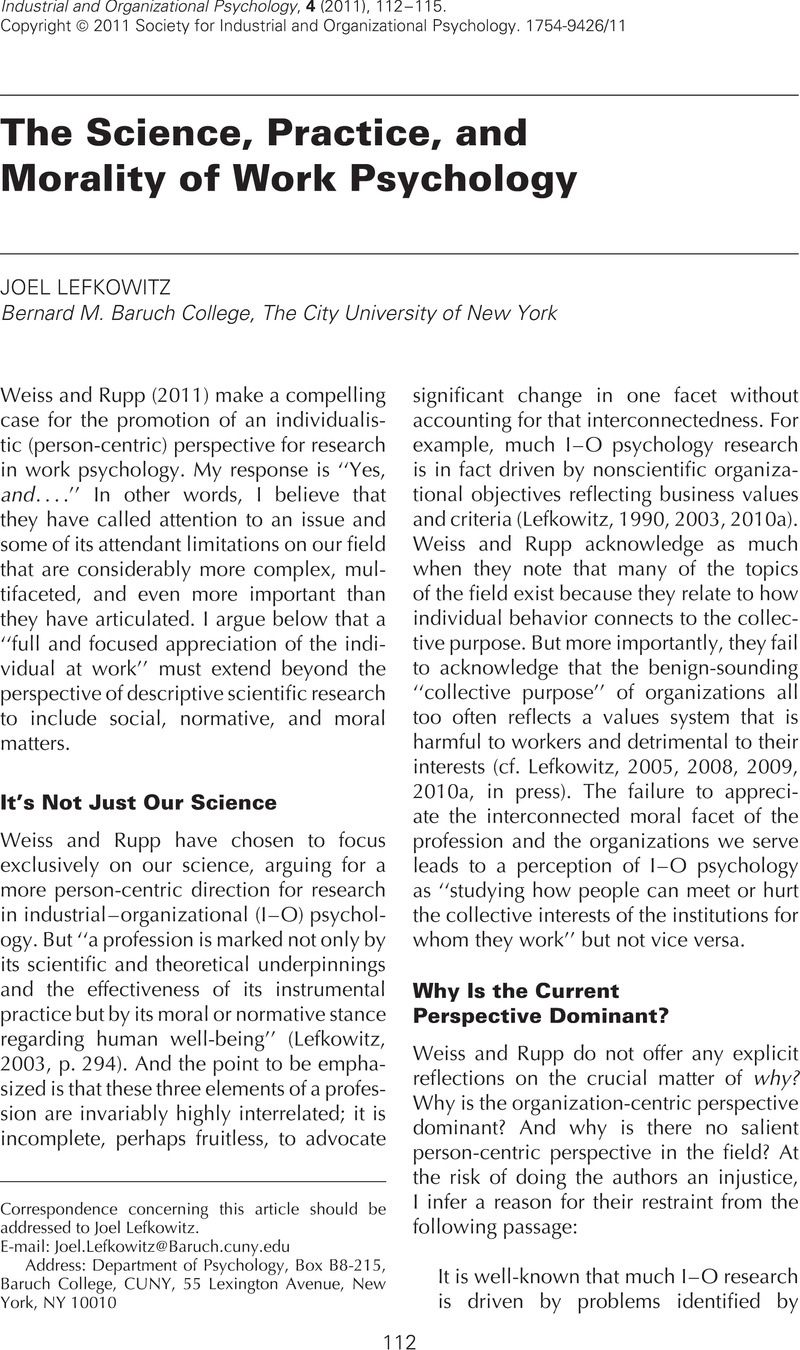Crossref Citations
This article has been cited by the following publications. This list is generated based on data provided by Crossref.
Weiss, Howard M.
and
Rupp, Deborah E.
2011.
Envisioning a Person-Centric Work Psychology.
Industrial and Organizational Psychology,
Vol. 4,
Issue. 1,
p.
138.
Letkowitz, Joel
2012.
Humanitarian Work Psychology.
p.
103.
Campana, Kristie
2014.
Industrial and Organizational Psychology Help the Vulnerable.
p.
243.
Lefkowitz, Joel
2014.
Educating Industrial–Organizational Psychologists for Science, Practice, and Social Responsibility.
Industrial and Organizational Psychology,
Vol. 7,
Issue. 1,
p.
38.
Lefkowitz, Joel
2014.
Psychology Departments Versus Business Schools: Tempest in a Teapot?.
Industrial and Organizational Psychology,
Vol. 7,
Issue. 3,
p.
311.
Lefkowitz, Joel
2016.
News Flash! Work Psychology Discovers Workers!.
Industrial and Organizational Psychology,
Vol. 9,
Issue. 1,
p.
137.
Gloss, Alexander
Carr, Stuart C.
Reichman, Walter
Abdul-Nasiru, Inusah
and
Oestereich, W. Trevor
2017.
From Handmaidens to POSH Humanitarians: The Case for Making Human Capabilities the Business of I-O Psychology.
Industrial and Organizational Psychology,
Vol. 10,
Issue. 3,
p.
329.
Lefkowitz, Joel
2017.
The Role of Values in Professional Licensing: The Resistance to Regulation.
Industrial and Organizational Psychology,
Vol. 10,
Issue. 2,
p.
223.
Lefkowitz, Joel
2019.
The conundrum of industrial-organizational psychology.
Industrial and Organizational Psychology,
Vol. 12,
Issue. 4,
p.
473.
Franeta, Duška
2019.
Taking Ethics Seriously.
European Psychologist,
Vol. 24,
Issue. 2,
p.
125.
Mallory, Drew B.
2021.
Trumped: a case study and critical reflections on the threats of unweighted positivity and external context to appreciative inquiry-led participative action research.
European Journal of Work and Organizational Psychology,
Vol. 30,
Issue. 3,
p.
363.
Islam, Gazi
and
Sanderson, Zoe
2022.
Critical positions: Situating critical perspectives in work and organizational psychology.
Organizational Psychology Review,
Vol. 12,
Issue. 1,
p.
3.
Lefkowitz, Joel
2022.
Organizational outcomes: It’s not (only) a levels issue.
Industrial and Organizational Psychology,
Vol. 15,
Issue. 3,
p.
432.
Dashtipour, Parisa
Gerard, Nathan
and
Rolo, Duarte
2025.
Toward an Ethics of Ambiguity in Critical Work and Organizational Psychology: From ‘Blank’ to ‘Troubled’ Subjectivity.
Journal of Business Ethics,
Vol. 197,
Issue. 2,
p.
219.



